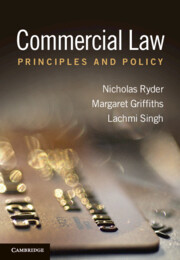Book contents
- Frontmatter
- Contents
- Preface
- List of abbreviations
- Table of Statutory Provisions
- Table of Cases
- Part 1 Agency
- Part 2 Sale of Goods and Services
- Part 3 International Trade and Sales
- Part 4 Tortious Liability for Defective Products
- Part 5 Unfair Commercial Practices
- Part 6 Banking and Finance Law
- Part 7 Consumer Credit
- Bibliography
- Index
Part 2 - Sale of Goods and Services
Published online by Cambridge University Press: 05 August 2012
- Frontmatter
- Contents
- Preface
- List of abbreviations
- Table of Statutory Provisions
- Table of Cases
- Part 1 Agency
- Part 2 Sale of Goods and Services
- Part 3 International Trade and Sales
- Part 4 Tortious Liability for Defective Products
- Part 5 Unfair Commercial Practices
- Part 6 Banking and Finance Law
- Part 7 Consumer Credit
- Bibliography
- Index
Summary
Introduction
Part 2 analyses the law relating to the sale and supply of goods and services, often considered to be at the heart of commercial law, many other strands of which depend upon the provision of goods and services and, hence, upon the existence of a relevant contract. In addition to these two specific types of contract, other contracts, such as hire contracts, involving the supply of goods are heavily dependent upon sale of goods legislation, often having some similar, if not identical provisions, particularly in relation to implied conditions regarding description and quality. These ancillary contracts will be referred to as appropriate in this part of the text.
Part 2 is divided into five chapters. The first deals with the policy issues underlying the development of sale of goods legislation and thus considers both its origins and the way that it has developed in the last century. It analyses the equality of bargaining power between the seller and the buyer and how the rise of consumerism in the last fifty years has affected the development of the law in this area. It also considers the impact of the European Union in the field of sale of goods both as regards remedies and the measures to regulate Internet trading. Finally, it looks at the distinction between contracts for the sale of goods and other contracts involving the transfer of the property or possession of goods.
- Type
- Chapter
- Information
- Commercial LawPrinciples and Policy, pp. 59 - 60Publisher: Cambridge University PressPrint publication year: 2012



